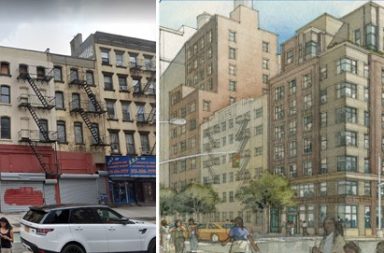Hundreds of property owners got a shocking surprise when they opened their property tax bills — a fine that in some cases topped $300,000.
The fine was either for not filing the 2012 Real Property Income & Expense Report by last fall, or $100 for not checking the exclusion box and filing by the June 2 deadline.
Only in New York can you be fined for not telling the city that you don’t need to file a form.
Many owners and managers don’t bother to glance at their tax bill because their mortgage company pays it — but the mortgage won’t cover fines or charges for emergency repairs or elevator and fire inspections.
If they did, they may have seen a line saying they might need to file this form.
Using the city’s most up-to-date public non-filer list dated Nov. 12, 2013, with 17,877 properties, we uncovered fines ranging from $1 to more than $300,000. While not everyone was fined, unless they later proved a timely filing, none can appeal their assessment at the city’s Tax Commission — the fastest way to cut your tax bill.
The new tax bills due July 1 were based on last year’s tax rates. Once the City Council agrees on a budget and sets new tax rates, owners may be rebilled a catch-up amount, likely next fall.
Getting back to the RPIEs, the 2012 filing was due in September 2013, but was extended to Dec. 16, 2013.
The Finance Web site states a penalty of 3 percent of the final Actual Assessed Value may be charged to non-filers. The law actually allows up to a 4 percent penalty if filed late the first year and 5 percent for the second year.
Those required to check a box to show they were “excluded,” and did not file that by this past June 2, may also notice a first-time penalty of $100.
The law now allows a fine of up to $500 for two years and $1,000 for three years of not filing this exclusion form by June 1 of each year, which is also the new RPIE deadline date.
According to Finance, for the 2013 RPIE filing, 65,956 reported by the June 2 deadline and 66,601 as of June 10.
The citywide noncompliance report for 2012 shows Manhattan had 3,264 on the list; the Bronx, 2,152; Brooklyn, 6,082; and Queens, 4,492, while Staten Island had just 886, as most assessed values are lower in this borough.
This year, Finance fined at 0.75 percent for the first year and 1.50 percent for two years of noncompliance. “Legally we can penalize up to 3 percent for first-time non-filers and 5 percent for longer-term noncompliance, but our policy has never exceeded 1.5 percent,” a spokeswoman said, adding, “The RPIE was never intended to be a revenue generator. Fines are in place to encourage property owners to file.”
The vast majority of non-filers are assessed at under $1 million.
Some observers believe this filing requirement should be bumped to only cover those AVs of $1 million and up and make it voluntary for smaller assessments, as Finance has plenty of data to conduct its primarily computer-assisted assessments.
Commissioner Jacques Jiha replied, “We value income-producing properties primarily based on RPIE information. If we didn’t have filings for properties with assessed values under $1 million, we would lose important information for the valuation process. But we are reviewing RPIE filing requirements to ensure that they are clear for property owners. We are also exploring the possibility of creating an RPIE-EZ tax form for smaller income-producing properties.”
The department was unable to provide the total amount of fines or the number of properties fined, but two fines we found of more than $300,000 are on a New York hotel and a cooperative on East 14th Street.
A cooperative with separately owned retail space by Carnegie Hall was fined $93,842. A downtown office building, owned and partially occupied by a nonprofit, was fined $91,122. Those we advised of the fines declined comment or did not return calls.
The Libyan government just received a $141,625 fine on June 2, but likely won’t pay it.
We’re hoping the new Commissioner can help clean up some of these files and issues.
The Atlanta-based Spanx is being squeezed into the entire sixth floor of 5,750 feet at 42 W. 39th St. for its first city offices and showroom. The 10-year, seven-month deal had an asking rent of $43 per square foot.
Corey Borg and Chris Mongeluzo of Newmark Grubb Knight Frank represented the tenant, while David Levy and Brett Maslin of Adams & Co. represented the ownership in this Transit Triangle area deal between Fifth and Sixth Avenues.
The New York Film Academy will premiere an extra 45,000 square-foot location at 26 Broadway — close to its current downtown spot at 17 Battery Place.
The historic former Standard Oil building at 26 Broadway once hosted John D. Rockefeller’s office as well as the now-defunct Sports Museum of America, which displayed the Stanley Cup the Rangers had just won at its 1994 founding announcement.
Howard Kesseler and Jamie Jacobs of Newmark Grubb Knight Frank represented the Film Academy as well as The Chetrit Organization owners.
The duo also worked both sides to create the new, 11,000 square-foot 26 Broadway Executive Suites.
The building has asking rents of $42 per square foot and signed recent deals totalling 126,000 square feet.
These also include Cornell University’s College of Architecture, Art and Planning for a new, 11,000 square-foot lease represented by Rob Eisenberg and Mark Weiss of NGKF.









